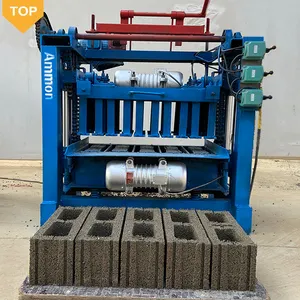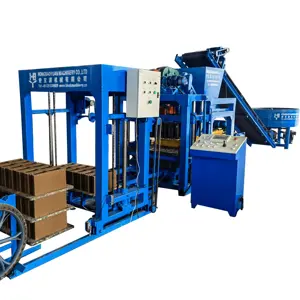(144752 products available)








































































































































































































The concrete block hollow machine is an essential equipment for producing hollow blocks. Various types of machines are available depending on the production method, level of automation, capacity, and block design. Here are some of the common types of concrete block hollow machines.
Manual Concrete Block Hollow Machine
This machine shapes concrete blocks manually using hand-operated levers or cranks. The operator manually feeds the concrete mix into the machine, controls the block formation by moving the lever or crank, and then removes the formed block. While requiring more labor than automated machines, manual machines are more affordable and accessible.
Small-Scale Semi-Automatic Machine
Working for small production volumes, semi-automatic machines have a combination of manual and automated processes. The operator manually feeds the concrete mix into the machine, then presses a button for the machine to automatically form the block. The block is then removed manually. Semi-automatic machines are affordable compared to fully automatic and increase efficiency with less labor than manual machines.
Semi-Automatic Concrete Block Machine
These machines have an automated block forming process but require manual feeding of concrete mix and block removal. Conveyor belts can be used to feed the material into the machine, which presses the concrete into the desired shape with manual help in block removal. It is a more efficient production style than fully manual operation.
Full Automatic Concrete Block Hollow Machine
Automatic machines manufacture large quantities of hollow blocks efficiently and productively. They have numerous features for easy use, such as a computer automation machine to control the block formation. This also allows for more precision in block creation with uniformity and consistency. In addition, only manual supervision is required to operate and maintain the machine. This system works well for large-scale production.
Vibration Concrete Block Hollow Machine
This machine produces blocks using vibration, which settles the concrete mix for greater density and strength. The vibration may be provided internally or externally by vibrating tables built into the machine. The block is then compacted further by the machine and is highly resistant to cracking, chipping, and other damage. The durability of these blocks makes it an ideal construction choice.
Multi-Functional Concrete Block Hollow Machine
These machines can produce different types of blocks, such as solid blocks, hollow blocks, insulated blocks, etc., by changing the molds. Multi-functional machines offer flexibility and versatility to meet changing production requirements. They also save space compared to having separate machines for each block type.
Understanding the specifications of a hollow block machine is important for knowing the production capacity, level of automation, and the kind of concrete mix it can handle.
Apart from knowing the specifications, it is also important to be aware of the Block making machine's maintenance requirements. Manufacturers often provide a maintenance schedule for the machine. On this schedule, they include the tasks that should be carried out regularly and any repairs that may be needed. It is crucial to follow the maintenance routine to ensure smooth, efficient, and long-lasting machine operation.
Some of the important maintenance tasks include inspecting hydraulic oil regularly and replacing it every 3 months. It is important to ensure that water, electricity, and other required systems are in good condition before starting to use the machine. Check mold and vibrating table parts daily for damage, and make repairs on the same day to prevent future issues. Some machine components may need lubrication. For instance, chains and gears should be lubricated at least once a week.
Another important maintenance task is to calibrate the machine and ensure that its production system works well. This is especially important for automated and semi-automatic machines with advanced technologies. Cleaning the block making machine and removing any concrete residue at least once every 14 days is a good way to maintain product quality. Finally, carry out periodic checks in the automatic hollow block machine to see if the essential components, like the motor, gearbox, and others, are working well or if they need to be repaired or replaced.
Concrete hollow block machines produce concrete blocks used in constructing diverse residential, commercial, and infrastructural projects. These machines are commonplace in large-scale construction sites and the following production industries:
When investing in a new concrete hollow block machine maker, buyers should look at different machine features. First of all, business buyers need to know the kind of raw materials they will be using. Some concrete hollow block-making machines can use fly ash, lime slag, sand, industrial wastes, slag, gravel, pebble, water, and cement, among others. So, it's vital that they first know the kind of material they'll be working with and pick a machine that will allow them to use it as input.
Block size and shape flexibility is another factor to consider. Most concrete hollow block-making machines are made to produce standard-sized blocks. However, form modifications might be required to manufacture unique sizes and forms. Business buyers should look for a machine that can adapt to their future needs.
Is it easy to use the concrete hollow block maker machine in question? It's a good idea to choose machines with user-friendly interfaces, detailed instructions, and settings that are intuitive. Additionally, automatic and semi-automatic machines are available, which means some will require manual labor input while others will require less manual input. If one has the budget for it, it’s better to go for machines that require less manual labor input because they also have higher productivity.
Regular maintenance is essential for keeping the block-making machine operating at its best. Therefore, it's a good idea for buyers to get machines whose spare parts are easy to find and whose servicing requirements are not too complicated. Additionally, when purchasing a concrete hollow block machine, buyers should consider the level of automation needed and block production capacity.
Finally, an energy-efficient machine will have less operating costs and will boost profitability. Therefore, buyers are advised to assess the energy consumption of the block-making machine and choose one that is efficient.
Q: How manual concrete block making machine works?
A: Generally, the machine consists of a block molding system, a concrete mixer, a feeding conveyor, and a control system. Firstly, the raw materials will be mixed into concrete though the concrete mixer. Then, the concrete will be transferred into the mold of the machine through the feeding conveyor. After that, the concrete will be shaped into blocks under the control of the operator. Finally, the formed blocks will be released and cured.
Q: What are the trends in concrete block machine technology?
A: There are several trends in block machine technology, such as automation and control technology, environmentally friendly and sustainable technologies, etc.
Q: How long does it take to learn how to operate a concrete block making machine?
A: The time required to learn how to operate a concrete block-making machine may vary depending on several factors, such as the complexity of the machine, the training program, and the individual's experience.
Q: Can the machine produce other types of blocks apart from concrete blocks?
A: Some machines are designed to produce a specific type of block, while others are versatile and can manufacture different kinds of blocks with certain modifications.